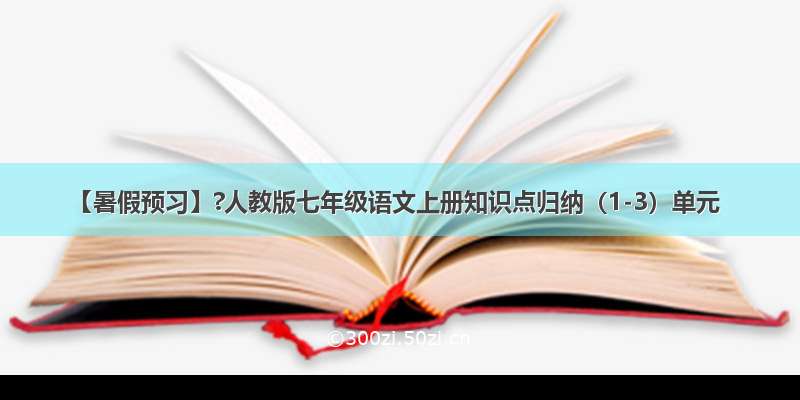
11. Its fun to do sth.做某事很有趣
12. encourage sb to do sth:鼓励某人做某
13. to one’s surprise 让某人感到惊奇地是,
14. stop to do sth. 停下来去做…
stop doing sth. 停止做…
15. play the violin/ piano 拉小提琴/ 弹钢琴
16. twomore questions
= another two questions另两个问题
17. be up to …由…而定
18. be ready to do sth. = get ready to do sth. 准备做某事
19. introduce … to sb. 把……介绍给某人
20. have been a…for + 一段时间成为… 有一段时间了
21. a girl named Mary一个名叫玛丽的女孩
22. see a movie = see a film = watch a movie看电影
23. get to know 逐渐认识
24. buy sb. sth. = buy sth. for sb.给某人买某物
25. wear clothes = be in clothes 穿着衣服put on clothes 穿上衣服
26. dress up 打扮,装扮
27. feel lucky to do sth. 做某事感到幸运
28. have the pleasure of doing…很高兴做…
29. make a deal 达成协议
30. invite sb. to do sth. 邀请某人做某事
第二单元
1. do well in = be good at 在……做得好
2. have a cough 咳嗽
3. be late for:... 迟到
4. have a math exan:进行一次数学考试
5. not…at all 一点也不…
6. learn about:学会了解
7. in two minutes 两分钟后(将来时)
8. too much sth. 太多的某物(事)
9. make sb. do sth. 使某人做某事
10. see sb. do sth. 看见某人做了某事
see sb. doing sth. 看见某人正在做某事
11. the best way to do sth. 做某事的最佳方式
12. lots of = a lot of 许多的
13. help sb. with sth. = help sb. (to) do sth
帮助某人做某事
14. turn off/ on the light关掉/ 打开灯
turn down 把…调小turn up 把…调大
15. half an hour 半小时half past ten 十点半a quarter = fifteen minutes 一刻钟a quarter to three差一刻三点three thirty 三点三十分= half past three 三点半a quarter past three三点一刻= a quarter after three
16. on time 准时;按时(时间点)in time 及时(时间范围内)
17. look for:寻找( 强调动作) find 找到(强调结果)
18. may be =maybe = perhaps 可能(是),大概;或许;
19. Childrens Day 儿童节Mothers Day母亲节Fathers Day 父亲节Teachers Day 教师节
20. give sb. a talk = give a talk to sb.给某人做报告
21. remind sb. of sth. 使某人想起…
22. has been to 去过某地has gone to 去了某地
has been in 呆在某地
23. in the future 在将来
24. be convenient for…对…方便
第三单元
1. National Day 国庆节Mid-Autumn Festival 中秋节Thanksgiving Day = Thanksgiving 感恩节
2. make a wish 许愿
3. such as / for example 比如,例如
4. be the same as:与...一样
5. blow out:吹灭
6. get together:聚在一起
7. around the world=all over the world:全世界
8. be in fashion:流行
9. in early October 十月上旬in late November 十一月下旬
10. try (it/ them) on试穿(它/它们)
11. add…to…把…加入…
12. face to face面对面
13. give sb a big hug = hug sb. 拥抱某人
14. stay in touch with…与…保持联系
15. as usual 像往常一样
16. find out (通过各种途径)找出;找到
17. send sth. to sb. 把某物寄/送给某人
18. pass sb. sth. = pass sth. to sb. 把某物递给某人
19. best wishes to sb. 向某人致以最美好的祝愿
20. on ones thirteenth birthday 在某人十三岁生日之际
21. on the top of 在……的上面
22. a seven-day holiday 一个七天的假期
23. have no luck 不走运
24. many thanks for sth. 非常感谢你的某物thanks a lot for doing sth. 非常感谢你做了某事
give thanks to... for ... 为... 感谢…
25. fit sb. very well 非常合某人身
26. send sth. to sb. = send sb. sth.给某人邮寄某物
27. have to = must 必须;不得不;
not have to = needn 不必
28. have fun doing sth. 做某事很开心
29.forget to do sth.忘记要做某事
forget doing sth. 忘记已做过某事
30. take a deep breath 做一个深呼吸
第四单元
1. on ones way to = on the way to在去...的路上
on ones wayhome/on the way home回家路上
2. take the/ a bus = go … by bus/ on a bus坐公共汽车
3. across from=be the opposite of在...对面
4. discuss with sb:与某人讨论
5. ask sb(not)to do sth:要求某人( 别)做某事
6. lose ones way = get/belost迷路, 走失
7. walk/ go straight along/ down沿着……一直走
8. be careful:小心;当心
9. No smoking! 禁止吸烟!
10. point to/ at 指向/着
11. turn left/ right 向左/右转
12. cross the street= go across the street穿过街道
13. go/ walk past/ by …走/路过……
go past/ by the park = pass the park 经过公园
14. at the top of 在……的顶部at the bottom of 在……的最下面at the foot of 在……的脚下in the bottom left corner 在左下角
15. shopping centre 购物中心parking lot 停车场
16. a piece of paper 一张纸
17. it’s …blocks from…距…有…个街区
18. Turn right at the second crossing.
在第二个路口向右拐。
19. keep(on) doing sth. 一直/ 不断做某事
20. It takes (sb.) …to do sth.(某人)花一些时间做某事
sth. cost sb. + 钱某物花某人多少钱
sb. spend…(in)doing sth.某人花费(时间/钱)做某事
21. sometime(将来)某个时候some time 一段(一些)时间sometimes有时,偶尔( 频率)some times几次;几倍
22. get to = arrive in/ at = reach到达
23. be busy doing sth. 忙于做…
24. have the flu 感冒
25. I ’m doing well. 我很好
26. so many books 如此多的书
so much water 这么多水
第五单元
1. hope to do sth. 希望做某事
2. be easy/ hard to do sth. 做某事容易/ 很难.
3. no matter what/who/ when/ where/ how 无论什么/ 谁/何时/何地/怎样
4. tell sb to do sth:告诉某人做某事
5. have a headache 头疼
6. be sure:对...有把握for sure 肯定地;确实
be sure that + 从句确信……be sure of sb./ sth. 对某事/某人有把握
be sure to do 一定/必然做…
7. when I am a man = when Im older = when I grow up当我长大后
8. be nice to sb. = be good to sb. = be kind to sb.对某人好(善待某人)
9. be sick = be ill 不舒服;生病
10. some advice一些建议a piece of advice 一条意见give advice 提出忠告take ones advice 接受忠告
give advice to sb. = give sb. advice给某人提建议
11. play withsth./sb. 拿某物来玩/与某人一起玩
12. so/too many + 复数名词如此多/ 太多的某物so/too much + 不可数名词如此多/ 太多的某物
13. in ten more years 再过十年
14. the rich/ poor 有钱人/穷人
the young/ old 年轻人/ 老年人
15. It doesn matter! 没关系!
16. take small steps to do sth 采取小步骤
17. write a letter to sb. = write sb. a letter = write to sb.给某人写信
18. run a business 经营生意
19. come true 实现
20. stop sb. from doing sth. 阻止某人做某事
21. be strict with sb. 对某人严格要求
22. take the medicine 吃药
23. have a good rest 好好休息
24. lead a team 领导一个团队
25. a fear of heights 恐高
第六单元
1. have a good talk:又一次愉快的交谈
2. keep doingsth. 继续做…
keep sb. doing sth. 让某人一直做…
keep sb. from doing sth. 阻止某人做…
3. in the 1780s 在十八世纪八十年代
4. over 100 years ago 一百多年前
5. all over the world = around the world = throughout the world世界各地;全世界
6. more than = over多于;超过
7. at first 一开始; 首先; 起初
at last = in the end = finally最后
8. the way to do sth.= the way of doing sth.做某事的方法
9. on the Internet 在因特网上
10. It is important for sb. to do sth. 对于某人来说, 做某事是很重要的。
11. be (not )able to do sth. ( 不) 能够做某事
12. thousandsof数以千计
13. be good for 对…有好处
14. get on and off 上下车
15. seem to do sth. 似乎做某事
16. stay up late 熬夜
17. give a presentation 做介绍
18. a few seconds 几秒钟
19. at the speed of 以…的速度
20. allow sb. to do sth. 允许某人做某事
be allowed to do sth. 被允许做某事
21. sound like 听起来像
22. all the time 一直
23. more than 多于,超过
24. be born…出生于…
第七单元
1. enjoy doing sth. 喜爱做某事
2. feel / be proud of …=take pride in对……感到骄傲
be proud to do sth. 做某事感到荣幸
3. see … doing … 看见……在干……
notice ... doing ... 留意到... 在干...
4. all kinds of 各种各样的many kinds of 许多种类的
different kinds of 不同种类的
5. havefun doing sth.某人做某事很有趣
6. be interested in 对. .. 感兴趣
7. model train/ ship/ plane 火车/轮船/飞机模型
8. like to fish 喜欢钓鱼
=like to go fishing 喜欢去钓鱼
9. What do you do withsth.?
How do you deal withsth? 你怎样处理某物?
10. glue sth. together 把某物粘贴到一起
11. joina club加入某组织(成为成员)take part in 参加某活动/ 体育项目
12. befull of =be filled with充满/装满/挤满
13. trade sth. with sb. 与某人交换某物
14. Its ones turn to do sth. 轮到某人做某事了。
15. go throughthe door 穿过门
16. put sth. on its side 把某物侧放
This side up!勿倒置!/ 这边向上!
17. get/ take sth. out of … 把某物从……取出
18. send sth. back to sb. 把某物寄回给某人write back to sb. 给某人回信
19. be made of 由…制成的( 能看出原材料)
be made from由…制成的( 不能看出原材料)be made in+ 地点 产自于某地
19. not … anymore = no more不再……
20. not only…but also…不但... 而且...
21. in your spare/free time 在你的空闲时间里
22. surf the Internet上网
23. take up开始做
24. take good care of...= look after... well好好照顾
25. two photo shops 两家照相馆
two women teachers两个女教师
26. stamp collection 集邮/ 收集的邮票
collect stamps 收集邮票
a stamp collecting club 集邮俱乐部
27. be alone (表语) 独自一人;单独
feel lonely (表语) 觉得孤单/ 寂寞
第八单元
1. make friends with sb与某人交朋友
2. be different from与...不同
3. be nervous about对...感到紧张
4. because of+ 短语=because+句子因为...;由于…
5. describe oneself 描述(某人)自己
6. be supposed to do sth. 应该做某事
7. what’s up? 怎么了?
8. make sense 有道理,有意义
9. sevenandahalf years = seven years and a half七年半one and a half weeks = one week and a half一周半
10. return to …= go back to …(返)回到…
return sth. to sb. = return sb. sth. = give sth. back to sb.
把某物还给某人
11. befar from … 离……很远
12. of course = sure = certainly当然
13. play against/ for… 与……进行比赛/ 效力于...
14. work hard at … 努力学习……
15. be talented at …= be good at … = do well in …在…方面有专长
16. be confident in/ of...= have confidence in ...
对...有信心
17. It’stime for sb. to do sth. 该某人做某事了。
18. in front of 在……(外部)的前面in the front of 在……(内部)的前部
19. go to university/ college 上大学
20. make mistakes:犯错误
21. help oneself to …. 随便吃/喝……
22. share sth with sb:与某人分享某事
23. try to do尽力做某事try doing sth. 尝试做某事
24. give up(doing ) 放弃做...
25. practice makes perfect 熟能生巧
26. dream of being... = dream to be梦想成为...
27. stong / weak points 优点/ 缺点
28. continue doing sth. 继续做某事
29. learn from ... 向/从... 学习
30. in one’s own way 以某人自己的方式
31. enjoy oneself玩的开心
32. teach oneself = learn... by oneself 自学
语法点滴
1) leave的用法
1.“leave+ 地点”表示“离开某地”。例如:
When did you leave Shanghai?
你什么时候离开上海的?
2.“leave for+ 地点”表示“动身去某地”。例如:
Next Friday, Alice is leaving for London.
下周五,爱丽斯要去伦敦了。
3.“leave+ 地点+for+地点”表示“离开某地去某地”。例如:
Why are you leaving Shanghai for Beijing?
你为什么要离开上海去北京?
2) 情态动词should“应该”学会使用
should 作为情态动词用,常常表示意外、惊奇、不能理解等,有“竟会”的意思,例如:
How should I know? 我怎么知道?
Why should you be so late today? 你今天为什么来得这么晚?
should 有时表示应当做或发生的事,例如:
We should help each other. 我们应当互相帮助。
我们在使用时要注意以下几点:
1. 用于表示“应该”或“不应该”的概念。此时常指长辈教导或责备晚辈。例如:
You should be here with clean hands. 你应该把手洗干净了再来。
2. 用于提出意见劝导别人。例如:
You should go to the doctor if you feel ill. 如果你感觉不舒服,你最好去看医生。
3. 用于表示可能性。should的这一用法是考试中常常出现的考点之一。例如:
We should arrive by supper time. 我们在晚饭前就能到了。
She should be here any moment. 她随时都可能来。
3) What...? 与 Which...?
1. what 与 which 都是疑问代词,都可以指人或事物,但是what仅用来询问职业。如:
What is your father? 你父亲是干什么的?
该句相当于:
What does your father do?
What is your fathers job?
Which 指代的是特定范围内的某一个人。如:
---Which is Peter? 哪个是皮特?
---The boy behind Mary. 玛丽背后的那个男孩。
2. What...? 是泛指,所指的事物没有范围的限制;而 Which...?是特指,所指的事物有范围的限制。如:
What color do you like best? (所有颜色)
你最喜爱什么颜色?
Which color do you like best, blue, green or yellow? (有特定的范围)
你最喜爱哪一种颜色?
3. what 与 which 后都可以接单、复数名词和不可数名词。如:
Which pictures are from China?
哪些图片来自中国?
4) 频度副词的位置
1. 常见的频度副词有以下这些:
always (总是,一直)
usually (通常)
often (常常,经常)
sometimes (有时候)
never (从不)
2. 频度副词的位置:
a. 放在连系动词、助动词或情态动词后面。如:
David is often arrives late for school.
大卫上学经常迟到。
b. 放在行为动词前。如:
We usually go to school at 7:10 every day.
我们每天经常在7 :10去上学。
c. 有些频度副词可放在句首或句尾,用来表示强调。如:
Sometimes I walk home, sometime I rides a bike.
有时我步行回家,有时我骑自行车。
3.never 放在句首时,主语、谓语动词要倒装。如:
Never have I been there.
我从没到过那儿。
5) every day 与 everyday
1. every day 作状语,译为“每一天”。如:
We go to school at 7:10 every day.
我们每天7 :10去上学。
I decide to read English every day.
我决定每天读英语。
2. everyday 作定语,译为“日常的”。
She watches everyday English on TV after dinner.
她晚饭后在电视上看日常英语。
Whats your everyday activity?
你的日常活动是什么?
6) 什么是助动词1. 帮助主要动词构成谓语动词词组的词叫助动词(Auxiliary Verb)。被协助的动词称作主要动词(Main Verb)。助动词自身没有词义,不可单独使用,例如:He doesn like English. 他不喜欢英语。(doesn 是助动词,无词义;like是主要动词,有词义)2. 助动词协助主要动词完成以下功用,可以用来:a. 表示时态,例如:He is singing. 他在唱歌。He has got married. 他已结婚。b. 表示语态,例如:He was sent to England. 他被派往英国。c. 构成疑问句,例如:Do you like college life? 你喜欢大学生活吗?Did you study English before you came here? 你来这儿之前学过英语吗?d. 与否定副词not合用,构成否定句,例如:I don like him. 我不喜欢他。e. 加强语气,例如:Do come to the party tomorrow evening. 明天晚上一定来参加晚会。He did know that. 他的确知道那件事。3. 最常用的助动词有:be, have, do, shall, will, should, would
7) forget doing/to do与remember doing/to do
1.forget to do 忘记要去做某事。 (未做)forget doing 忘记做过某事。 (已做)The light in the office is still on. He forgot to turn it off.办公室的灯还在亮着,它忘记关了。( 没有做关灯的动作)He forgot turning the light off. 他忘记他已经关了灯了。 ( 已做过关灯的动作)Don forget to come tomorrow.别忘了明天来。 (to come 动作未做)典型例题---- The light in the office is still on.---- Oh ,I forgot___.A. turning it off B. turn it off
C. to turn it off D. having turned it off答案:C 。由the light is still on 可知灯亮着,即关灯的动作没有发生,因此用forget to do sth.而forget doing sth表示灯已经关上了,而自己忘记了这一事实。此处不符合题意。
2.remember to do 记得去做某事 (未做)remember doing 记得做过某事 (已做)Remember to go to the post office after school.记着放学后去趟邮局。Don you remember seeing the man before? 你不记得以前见过那个人吗?
8) Its for sb.和 Its of sb.
1.for sb. 常用于表示事物的特征特点,表示客观形式的形容词,如easy, hard, difficult,interesting, impossible等:Its very hard for him to study two languages. 对他来说学两门外语是很难的。2.of sb 的句型一般用表示人物的性格,品德,表示主观感情或态度的形容词,如good, kind, nice, clever, foolish, right。Its very nice of you to help me. 你来帮助我,你真是太好了。3.for 与of 的辨别方法:用介词后面的代词作主语,用介词前边的形容词作表语,造个句子。如果道理上通顺用of ,不通则用for。如:You are nice. (通顺,所以应用of)。He is hard. (人是困难的,不通,因此应用for。)
9) 对两个句子的提问
冀教英语在命题中有将对句子划线提问这一题型取消的趋势,现在采取的作法是对一个句子进行自由提问。例如:
句子:The boy in blue has three pens.
提问:1.Who has three pens?
2.Which boy has three pens?
3.What does the boy in blue have?
4.How many pens does the boy in blue have?
很显然,学生多了更多的回答角度,也体现了考试的灵活性。再如:
句子:He usually goes to the park with his friends at 8:00 on Sunday.
提问:1.Who usually goes to the park with his friends at 8:00 on Sunday?
2.Where does he usually go with his friends at 8:00 on Sunday?
3.What does he usually do with his friends at 8:00 on Sunday?
4.With whom does he usually go to the park at 8:00 on Sunday?
5.What time does he usually go to the park with his friends on Sunday?
6.When does he usually go to the park with his friends?
10) so、such与不定冠词的使用
1.so 与不定冠词a、an连用,结构为“so+形容词+a/an+名词”。如:
He is so funny a boy.
Jim has so big a house.
2.such 与不定冠词a、an连用,结构为“such+a/an+形容词+名词”。如:
It is such a nice day.
That was such an interesting story.
11) 使用-ing分词的几种情况
1. 在进行时态中。如:
He is watching TV in the room.
They were dancing at nine oclock last night.
2. 在there be结构中。如:
There is a boy swimming in the river.
3. 在have fun/problems结构中。如:
We have fun learning English this term.
They had problems getting to the top of the mountain.
4. 在介词后面。如:
Thanks for helping me.
Are you good at playing basketball.
5. 在以下结构中:
enjoy doing sth 乐于做某事
finish doing sth 完成做某事
feel like doing sth 想要做某事
stop doing sth 停止做某事
forget doing sth 忘记做过某事
go on doing sth 继续做某事
remember doing sth 记得做过某事
like doing sth 喜欢做某事
keep sb doing sth 使某人一直做某事
find sb doing sth 发现某人做某事
see/hear/watch sb doing sth 看到/听到/观看某人做某事
try doing sth 试图做某事
need doing sth 需要做某事
prefer doing sth 宁愿做某事
mind doing sth 介意做某事
practice doing sth 练习做某事
be busy doing sth 忙于做某事
can help doing sth 禁不住做某事
miss doing sth 错过做某事
12) 英语中的“单数”
1. 主语的第三人称单数形式,即可用“he,she,it”代替的。如:
he, she, it
my friend, his teacher, our classroom, Tom, Marys uncle
2. 名词有单数名词和复数名词。如:
man (单数)---men(复数)banana(单数)---bananas(复数)
3. 动词有原形,第三人称单数形式,-ing分词,过去式,过去分词。如:
go---goes---going---went---gone
work---works---working---worked---worked
watch---watches---watching---watched---watched
当主语为第三人称单数的时候,谓语动词必须用相应的第三人称单数形式。如:
The boy wants to be a sales assistant.
Our English teacher is from the US.
Their daughter makes her breakfast all by herself.
13) 名词的复数构成的几种形式
名词复数的构成可分为规则变化和不规则变化两种。
I 名词复数的规则变化
1. 一般在名词词尾加-s。如:
pear---pears hamburger---hamburgers
desk---desks tree---trees
2. 以字母-s, -sh, -ch, -x结尾的名词,词尾加-es。如:
class---classes dish---dishes
watch---watches box---boxes
3. 以字母-o结尾的某些名词,词尾加-es。如:
potato---potatoes tomato---tomatoes
Negro---Negroes hero---heroes
4. 以辅音字母加-y结尾的名词,将-y变为-i,再加-es。如:
family---families dictionary---dictionaries
city---cities country---countries
5. 以字母-f或-fe结尾的名词,将-f或-fe变为-v,再加-es。如:
half---halves leaf---leaves
thief---thieves knife---knives
self---selves wife---wives
life---lives wolf---wolves
shelf---shelves loaf---loaves
但是:
scarf---scarves(fes) roof---roofs
serf---serfs gulf---gulfs
chief---chiefs proof---proofs
belief---beliefs
II 名词复数的不规则变化
1. 将-oo改为--ee。如:
foot---feet tooth---teeth
2. 将-man改为-men。如:
man---men woman---women
policeman---policemen postman---postmen
3. 添加词尾。如:
child---children
4. 单复数同形。如:
sheep---sheep deer---deer
fish---fish people---people
5. 表示“某国人”的单、复数变化。即“中日瑞不变英法变,其它国把-s加后面”。如:
Chinese---Chinese Japanese---Japanese
Swiss---Swiss
Englishman---Englishmen Frenchman---Frenchmen
American---Americans Australian---Australians
Canadian---Canadians Korean---Koreans
Russian---Russians Indian---Indians
6. 其它。如:
mouse---mice
apple tree---apple trees
man teacher---men teachers
14) 双写最后一个字母的-ing分词
初中阶段常见的有以下这些:
1.let→letting 让
hit→hitting 打、撞
cut→cutting 切、割
get→getting 取、得到
sit→sitting 坐
forget→forgetting 忘记
put→putting 放
set→setting 设置
babysit→babysitting 临时受雇照顾婴儿
2.shop→shopping 购物
trip→tripping 绊
stop→stopping 停止
drop→dropping 放弃
3.travel→travel(l)ing 旅游
swim→swimming 游泳
run→running 跑步
dig→digging 挖、掘
begin→beginning 开始
prefer→preferring 宁愿
plan→planning 计划
15) 肯定句变否定句及疑问句要变化的一些词
1.some 变为any。如:
There are some birds in the tree.
→There aren any birds in the tree.
但是,若在表示请邀请、请求的句子中,some 可以不变。如:
Would you like some orange juice?
与此相关的一些不定代词如something, somebody 等也要进行相应变化。
2.and 变为or。如:
I have a knife and a ruler.
→I don have a knife or a ruler.
3.a lot of (=lots of) 变为many或much。如:
They have a lot of friends. (可数名词)
→They don have many friends.
There is lots of orange in the bottle. (不可数名词)
→There isn much orange in the bottle.
4.already 变为yet。如:
I have been there already.
→I haven been there yet.
16) in与after
in 与 after 都可以表示时间,但二者有所区别。
1.in 经常用于将来时的句子中,以现在为起点,表示将来一段时间。如:
He will leave for Beijing in a week.
一周后他会动身去北京。
2.after 经常用于过去时的句子中,以过去为起点,表示过去一段时间。如:
He left for Beijing after a week.
一周后他动身去了北京。
不过,如果after 后跟的是具体的时刻,它也可用于将来时。如:
We will finish the work after ten oclock.
十点后我们会完成工作的。
3. 注意区分以下的in的用法。
Ill visit him in a week.
一周后我会去拜访他。
Ill visit him twice in a week.
一周内我会去拜访他两次。
17) 不定冠词a与an的使用
1.a 用在以辅音音素开头的单词前。如:
There is a "b" in the word "book".
单词book 中有个字母b。
类似的字母还有:b,c, d, g, j, k, p, q, t, u, v, w, y, z 。
She has a small knife.
她有一把小刀。
2.an 用于以元音音素开头的单词前。如:
There is an "i" in the word "onion".
单词onion 中有个字母i。
类似的字母还有:a, e, f, h,i, l, m, n, o, r, s, x 。
Do you have an umbrella?
你有一把雨伞吗?
3. 以元音字母开头的单词前面不一定都用an;以辅音字母开头的单词前面也不一定都用a。如:
a useful book
a university
a one-letter word
an hour
an uncle
an umbrella
an honest person
18) 如何表达英语中的“穿、戴”?
英语中表示“ 穿、戴”的表达方法有好几种,常见的有以下这些:
1 、put on 主要表达“穿”的动作。如:
He put on his coat. 他穿上了他的外套。
Youd better put on your shoes. 你最好穿上你的鞋子。
2 、wear 主要表示“穿、戴”的状态。如:
The old man wears a pair of glasses. 老人戴着一副眼镜。
The girl is wearing a red skirt. 那女孩穿着一条红色的短裙。
3 、dress 可作及物动词,有“给......穿衣”的意思,后接“人”,而不是“衣服”。如:
Please dress the children right now. 请立即给孩子们穿上衣服。
dress 也可作不及物动词,表示衣着的习惯。如:
The woman always dresses in green. 那位妇女总是穿绿色的衣服。
4 、be in 表示穿着的状态。如:
John is in white today. 约翰今天穿白色的衣服。
The man in black is a football coach.
19) a little, a few 与 a bit (of)
a little, a few 与 a bit (of) 都有“一些、少量”的意义。他们的区别在哪里呢?
1. a little 意为“一些、少量”,后接不可数名词。如:
There is a little water in the bottle. 瓶子里有一点水。
还可以接形容词。如:
He is a little shy. 他有些害羞。
2. a few 意为“一些、少数”,后接复数的可数名词。如:
There are a few people in the room. 房间里有一些人。
3. a bit 意为“一点儿”,后接形容词。如:
Its a bit cold. 有点冷。
a bit of 后接不可数名词。如:
He has a bit of money. 他有一点儿钱。
4. a little 表肯定意义,little 表否定意义;a few 表肯定意义,few 表否定意义。如:
There is a little soda in the glass. 杯子里有一点儿汽水。
There is little soda in the glass. 杯子里几乎没有汽水了。
I have a few Chinese friends. 我有一些中国朋友。
Few people like him. 几乎没有人喜欢他。
5. a little = a bit of, 后接不可数名词;
a little = a bit = a little bit = kind of, 后接形容词,意为“有点儿”。
25) other及其用法
Other 及其相近的词(组),如 others, the other, the others, another, any other 等,一直是中学生朋友们比较困扰的问题,平常的考试、作业中经常出错。下面是它们的一些用法:
1、other 指其余的人或物,所有格是 others,复数形式是 others,the other 指“两个人或物中的另一个”,其复数形式是 the others,others 相当于“other + 名词”,所以不能充当定语,修饰名词。others指整体中去掉一部分后剩余的部分,但不是全部的,即 some...others (一些...其余的人...)。the others 强调整体中除去一部分后剩余的全部,即some...the others.
2、another 泛指三个以上的不定数目中的“另外一个”。由 an 和 other 合并构成,所以不能和冠词连用。another 修饰单数名词,比如:another pencil.
3、any other 指除去本身以外的“任何其他的人或物”,后面要用名词的单数形式。
26) look 短语
常见的look短语有以下这些:
1.look at 朝......看
Please look at the map of China.
请看中国地图。(look at=have a look at)
2.look for 寻找
The old man is looking for his dog.
老人在寻找他的狗。
3.look like 看起来像
Nancy looks like her mother.
南希看起来像她母亲。
4.look the same 看上去一样
Li Ping and Li Jing look the same.
李萍和李晶看上去一样。
5.look up 查找
Please look up the word in the dictionary.
请在词典中查找这个单词。
6.look over 仔细检查
The doctor looked over Mary carefully.
医生仔细检查了玛丽。
7.look after 照顾,照看
You must look after your old father.
你必须照顾你的老父亲。
8.look around 到处寻找、查看
We looked around, but we found nothing strange.
我们四处查看,但是我们没有发现奇怪的东西。
27) too,also与either
1.too用于肯定句和疑问句,一般放在句尾,其前常加逗号。如:
We are in the same school, too.
我们也在相同的学校。
Do you play soccer every day, too?
你也每天踢足球吗?
2.also用于肯定句和疑问句,一般位于实义动词前、be动词后。如:
Sandra is also a Korean student.
Sandra 也是一个韩国学生。
3.either用于否定句,一般放在句末。如:
They don know the answer, either.
她们也不知道答案。
4.as well as也有“也”的意思。如:
We have great mushroom pizza as well as soda.
He is a happy boy as well.
28) hard与hardly
1.hard既可作形容词,也可作副词。如:
Its a hard(adj.) question. (=difficult)
这是一个难的问题。
The boy studies very hard(adv.).
那男孩学习非常努力。
句子结构:Its hard for sb to do sth 做某事对某人来说是难的。如:
Its hard for him to finish the work. 完成那项工作对他来说很难。
注意区分:hard work 困难的工作
work hard 努力工作
2.hardly是频度副词,表示否定的意思。(=almost not)通常用在形容词、副词和动词之前。如:I can hardly see it.
我几乎看不到它。
29) sometime,sometimes,some time与some times
1.sometime是时间副词,指不确定的将来或过去某一点时间(某时候或任何时候),不指一段时间。如:
Well go to Beijing sometime next month.
我们下个月某一时候会去北京。
2.sometimes是频度副词,指“有时”、“不时”的意思(=at times)。如:
Sometimes I get up very late on Sunday morning.
有时候我在星期天早晨起得很晚。
3.some time是名词词组,指一段时间(一些时间或若干时间)。如:
It took him some time to finish the book.
她花了一些时间去完成作业。
4.some times指“几次”。如:
He met the woman some times last month.
上个月他见过那妇女几次。
30) exercise的一些用法
1.作不及物动词,译为“运动,锻炼”。如:
David exercises every morning.
大卫每天早晨进行锻炼。
2.作及物动词,译为“训练”。如:
Swimming exercises the whole body.
游泳能使身体得到全面的锻炼。
3.作名词,译为“体育锻炼、运动、体操、练习题”等。如:
Its good to do eye exercises every day.
每天做眼保键操对眼睛有好处。
Please do more exercise from now on.
从今以后请多做运动吧。
I have lots of homework to do tonight.
今晚我有很多的作业要做。
4.注意:exercise指具体运动或体操时是可数名词,复数形式为exercises;泛指运动时是不可数名词。
31) maybe与may be
1.maybe是副词,译为“也许、可能”,相当于“perhaps”。如:
Maybe he can answer the question.
也许他能回答那个问题。
He maybe is from the USA, too.
他可能也来自美国。
2.may be中的may为情态动词,译为“可能是......”。如:
He may be from the USA, too.
他可能也来自美国。
She may be our English teacher.
她可能是我们的英语老师。
32) same与different
1.same指“相同的”,前面通常要有一个定冠词the,但是如果same前面已经有this,those等词,就不能再与the连用了。如:
We are in the same class.
我们在同一个班级。
结构:the same as 与......一样 如:
His mark is the same as mine.
他的分数和我的分数一样。
2.different译为“不同的”,其后的可数名词应为复数形式。如:
We are in different classes.
我们在不同的班级。
结构:be different from 与......不同 如:
This sweater is different from that one.
这件毛衣与那一件不同。
different的名词形式为difference, 复数形式为differences。
33) 动词want的用法
1.want sth. 想要某物
They want some help.
他们需要一些帮助。
2.want sb. to do sth. 想要某人去做某事
My father wants me to help him on the farm.
我父亲要我在农场上帮他。
3.want to do sth. 想要做某事
I want to study English in England.
我想要在英国学习英语。
4.want doing 需要...
Your sweater wants washing.
你的运动衣该洗了。
34) be good(bad) for、be good at的相关用法
1.be good for 对......有益
Doing morning exercises is good for your health.
做早操对你们的建康有益。
2.be good at 擅长于......
Li Ping is good at basketball.
李平擅长于篮球。
= Li Ping is good at playing basketball.
李平擅长于打篮球。
be good at = do well in 如:
Im good at math. = I do well in math.
我擅长于数学。
3.be good to 对......好
Parents are always good to their children.
父母亲总是对他们的孩子好。
35) how many与how much
1.how many表示“多少”,对数量提问,后面接可数名词的复数形式。如:
There are fourpeople in my family.
---How many people are in your family?
你家里有几个人?
We have sevenclasses every day.
---How many classes do you have every day?
你们每天上几节课?
2.how much也是表示“多少”,但它对不可数名词进行提问。如:
There is somemilk in the bottle.
---How much milk is there in the bottle?
瓶子里有多少牛奶?
3.how much还可以对价格提问,表示“多少钱”的意思。如:
The yellow T-shirt is only 35 yuan.
---How much is the yellow T-shirt?
那件黄色的T恤衫多少钱?
36) with的几个用法
1.with 表“和、同、与”。如:
Can you go to the park with me?
你能和我一起去公园吗?
2.with 表“用、以、被”。如:
Don write with the red pen.
不要用那支红色的钢笔写字。
3.with 表“随着”。如:
Climate varies with the time of the year.
气候随着时令的不同而不同。
4.with 表“带有、有......的”。如:
The girl with long hair is my classmate.
长头发的女孩是我的同学。
5.with 表“因为、由于”。如:
They were angry with hard work.
他们因为艰难的工作而生气。
6. 一些with结构:
play with 与......一起玩
be angry with 对......生气
talk with 与......交谈
get on well with 与......相处融洽
37) a lot of(lots of)与many,much
1.a lot of 意为“许多、大量”。相当于lots of。它既可以修饰可数名词,又可以修饰不可数名词。如:
I have a lot of friends in China.
我在中国有很多朋友。
The old man has lots of money.
那位老人有很多的钱。
2.many 意为“许多”。它用来修饰可数名词。如:
Do you have many beautiful skirts?
你有很多漂亮的裙子吗?
3.much 意为“大量”。它用来修饰不可数名词。如:
There is much water in the lake.
湖里有大量的水。
4.a lot of (=lots of)用在肯定句中,而many,much不受限制。如果将一个含有alot of (=lots of)的肯定句改为否定句或疑问句,要将它们改为many或much。如:
We can see a lot of birds in the tree.
---We can see many birds in the tree.
我们在树上看不到很多鸟儿。
He wants lots of soda.
---Does he want much soda?
他需要许多汽水吗?
38) help用法举例
help 既可以作名词,也可以作动词。
1.help 作名词,意为“帮助”。如:
He needs some help.
他需要一些帮助。
2.help 作动词,也是“帮助”的意思。如:
Can you help me?
你能帮帮我吗?
3.help 的结构:
help sb (to) do sth 帮助某人做某事
=help sb with sth 帮助某人做某事
如:
They want to help the boy carry the heavy box.
=They want to help the boy with the heavy box.
他们想要帮助那位男孩搬那个重箱子。
39) well的用法
well 可以作副词,也可以作形容词。
1.well 作副词,意为“(某事干得)好”。如:
The boy draws very well.
男孩画得很好。
2.well 作形容词,意为“健康、安好”。如:
Im not feeling well.
我觉得不舒服。
40) ago与before
ago 与before都表示“......以前”,但用法有所区别。
1.ago 意为“以前”,表示从此刻算起的若干时间之前,常用于过去时的句子中。如:
He took a photo a week ago.
他一周前照了一张相片。
2.before 作为副词时表示:
a. 从过去某一时刻算起的若干时间以前,用于过去完成时的句子中。如:
The boy had already seen the comedy before.
那男孩以前已经看过那部喜剧片了。
b. 笼统的“以前”,用于一般过去时或现在完成时的句子中,一般单独使用,而ago不可以单独使用。如:
Hes read this novel before.
他以前读过这部小说。
41) need的用法
1.need作实义动词,意为“需要”。如:
Do you need to stay at home?
你要呆在家里吗?
2.need作情态动词,一般用于对must的否定回答。如:
---Must he leave now? 他必须离开吗?
---No, he needn . 不,他不必。
3.区分:
a.need作实义动词。
He needs to go.
He doesn need to go.
Does he need to go?
Yes, he does./No, he doesn .
b.need作情态动词,一般不用于肯定句。
He needn go.
Need he go?
Yes, he need./No, he needn .
42) decide的几种句式
1.decide to do sth 决定去做某事
They decide to fly kite on weekend.
他们决定在周末去放风筝。
2.decide on doing sth 决定做某事
They decide on flying kites.
他们决定放风筝。
3.decide on sth 就某事决定......
Betty decided on the red skirt.
贝蒂选定了那条红裙子。
4.decide的名词形式为decision,结构:make a decision,意为“做决定”。如:
He has made a decision.
他已经做一个决定了。
43) too many,too much与much too
1.too many意为“太多”,用于修饰可数名词的复数。如:
There are too many students in our class.
我们班上有太多的学生。
2.too much意为“太多”,用于修饰不可数名词。如:
We have too much work to do.
我们有太多的工作要做。
3.much too表示“太”,用来修饰形容词或副词。如:
The box is much too heavy, so I can carry it.
箱子太重了,所以我搬不动它。
44) can的用法
1.表示能力。如:
We can carry the heavy box.
我们可以搬得动箱子。
Who can sing an English song?
谁会唱英文歌?
2.表示惊讶、不相信等态度,主要用于否定句和疑问句中。如:
Can it be true?
这会是真的吗?
You can be serious?
你不会当真吧?
3.表示允许,意思与may相近,主要用于口语中。如:
Can I smoke here?
我可以在这儿吸烟吗?
Can I go with him?
我可以跟他一起去吗?
▍ 声明:本文整理自网络,如有侵权,请联系删除。
















